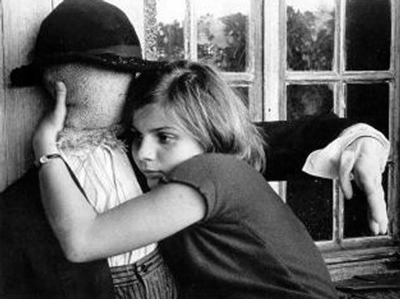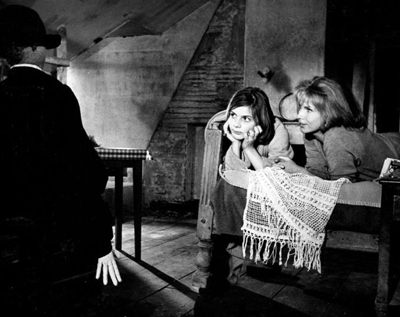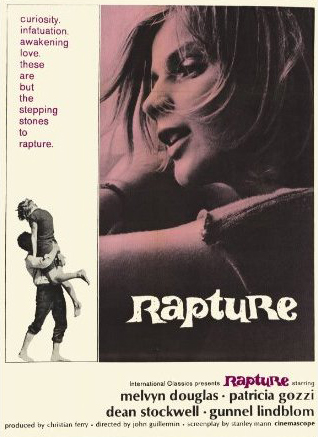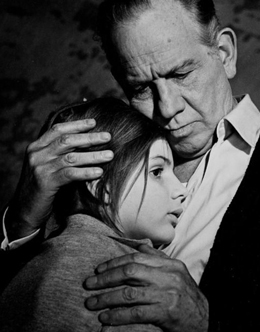
 |
|
|
|
One doesn't expect to see an obscure '60s title chosen for Blu-ray presentation, which makes Twilight Time's Rapture a very interesting surprise. Director John Guillermin and his producer Christian Ferry seem to have made this film in tandem with the much more mainstream, and far more expensive WW1 flying epic The Blue Max. Filmed on the Brittany Coast in France with a mix of American and European actors, Rapture is an intense little drama with fine performances and careful direction. The labor of love should have made a star of its young leading actress Patricia Gozzi. A quiet but deeply emotional drama of family secrets, the show makes us care strongly about the fates of its characters. 
Retired judge Frederick Larbaud, a widower, lives in a lonely stone house overlooking the ocean. His oldest daughter Genevieve (Sylvia Kay) marries, leaving Larbaud with the younger Agnes (Patricia Gozzi), a teenager suffering from emotional problems. Still behaving like a child, Agnes was forced to leave school at twelve, and at least once Larbaud threatens to put Agnes in a mental hospital. The housekeeper Karen (Gunnel Lindblom of numerous Ingmar Bergman pictures) sneaks young men into her room at night, which confuses Agnes -- she doesn't know what they do, but the noises are definitely stimulating. The girl "wants someone for herself alone" so badly that even her strict father relents, and allows her to construct a scarecrow for the yard. Agnes develops a disturbing fantasy life around the scarecrow, which unexpectedly "comes to life" one stormy night. Joseph, an escaped police prisoner (Dean Stockwell) changes into the scarecrow's suit and hides in the barn. Instead of turning him in, Agnes, Karen and Larbaud dress the young man's wound and shield him from the gendarmes. Agnes persists in believing that she 'created' Joseph, and is fearful that the wayward Karen will take him away from her. Frederick wants Joseph to help him finish his book, a plea for a more compassionate justice system. But Joseph seriously wounded a policeman while making his escape; all know that it is only a matter of time before the authorities track him down. 
Rapture sees director John Guillermin making a play for serious artist status. The movie has the moody visual feel of a Ingmar Bergman drama. The presence of actress Lindblom cements this connection, and even the type style of the main title reminds us of a Swedish production. The show is meticulously directed, with Guillermin accenting most scenes with restrained but effective camera moves. The characters' emotions are carefully observed. At the center of the unhappiness is Melvyn Douglas's Larbaud, a man who loved a wife who didn't love him back. Having quit his judge-ship under questionable circumstances, Frederick bullies Agnes and writes political pamphlets as a distraction from his personal problems. His bitterness has resulted in Agnes's severe personality disorder. A casual observer may see a similarity between Rapture and Bryan Forbes' sad little story of working-class miseries, Whistle Down the Wind. In that film a young Hayley Mills thinks that an escaped convict is really Jesus Christ. Agnes seems to "will" her scarecrow to life, in scenes that remind us a bit of the odd, vintage noir entry Follow Me Quietly. Confusing a raggedy scarecrow with actor Dean Stockwell might be silly if it weren't for the intense performance of the little-known Patricia Gozzi. Agnes is convincing as an emotionally arrested but sweet and honest young woman, and we care very deeply what becomes of her. The writers don't try to make Agnes a 'magical' character, an innocent with a halo. She displays a full range of desires and emotions, but not enough experience in the real world. A sad chapter sees Agnes incapable of functioning in the city, like a character from James Joyce. 
With its volatile cast of characters Rapture generates considerable suspense. Director Guillermin manages an unpredictable mood despite the overly familiar dramatic framework. Errant outsider Joseph comes to the dysfunctional family and everything changes. He responds to their care and appreciates Agnes' impassioned attentions, but can't resist the appealing Karen. Although we know in general where the story is heading, none of the plot's many turns is predictable. All of the acting is commendable, but the impressive Ms. Gozzi is what we remember. The actress seems very modern in the role, and comes off as a more animated, emotionally expressive Nastassja Kinski. Agnes' eventual pairing with Joseph is so tender that viewers might not pick up on what is now considered an abusive relationship: Agnes is supposed to be only fifteen years of age. Stanley Mann (Woman of Straw, A High Wind in Jamaica, The Collector, The Naked Runner receives sole screenplay credit, but we're told that veteran Italian writer Ennio Flaiano had a hand in the adaptation. Flaiano has more classic Italian film credits than anyone, including scores of Federico Fellini hits. 
Twilight Time's Blu-ray of Rapture is a thing of beauty, from the very first aerial shot of a car cruising along a cliff-top road. Fox must have had an HD transfer of the show tucked away in its vault, and Twilight Time became aware of its qualities. The B&W CinemaScope cinematography by Marcel Grignon (Vadim's Les Liasons Dangereuses, Clément's Is Paris Burning?, Borowczyk's The Beast) is breathtaking. The wildness of the cliff-top house makes for beautiful vistas, but Grignon's interiors are just as evocative. The romantic music score is by Georges Delerue, who in 1965 had already accrued an enviable list of top credits. Twilight Time's one extra is an Isolated Music Score of the best kind. The original music cues, including the sound of the conductor starting the orchestra, have been synchronized to the film with no other audio, which results in a viewing experience much like a cinematic concert. We also appreciate exactly where Delerue (and Guillermin?) have chosen to place music in the film. The "spotting" of the cues is an important choice. One long conversation between characters is music-free until a quick kiss provides just the right moment for the orchestra to make its entrance.
On a scale of Excellent, Good, Fair, and Poor,
Rapture Blu-ray rates:
Reviews on the Savant main site have additional credits information and are often updated and annotated with reader input and graphics. Also, don't forget the 2011 Savant Wish List. T'was Ever Thus.
Review Staff | About DVD Talk | Newsletter Subscribe | Join DVD Talk Forum |
| ||||||||||||||||||